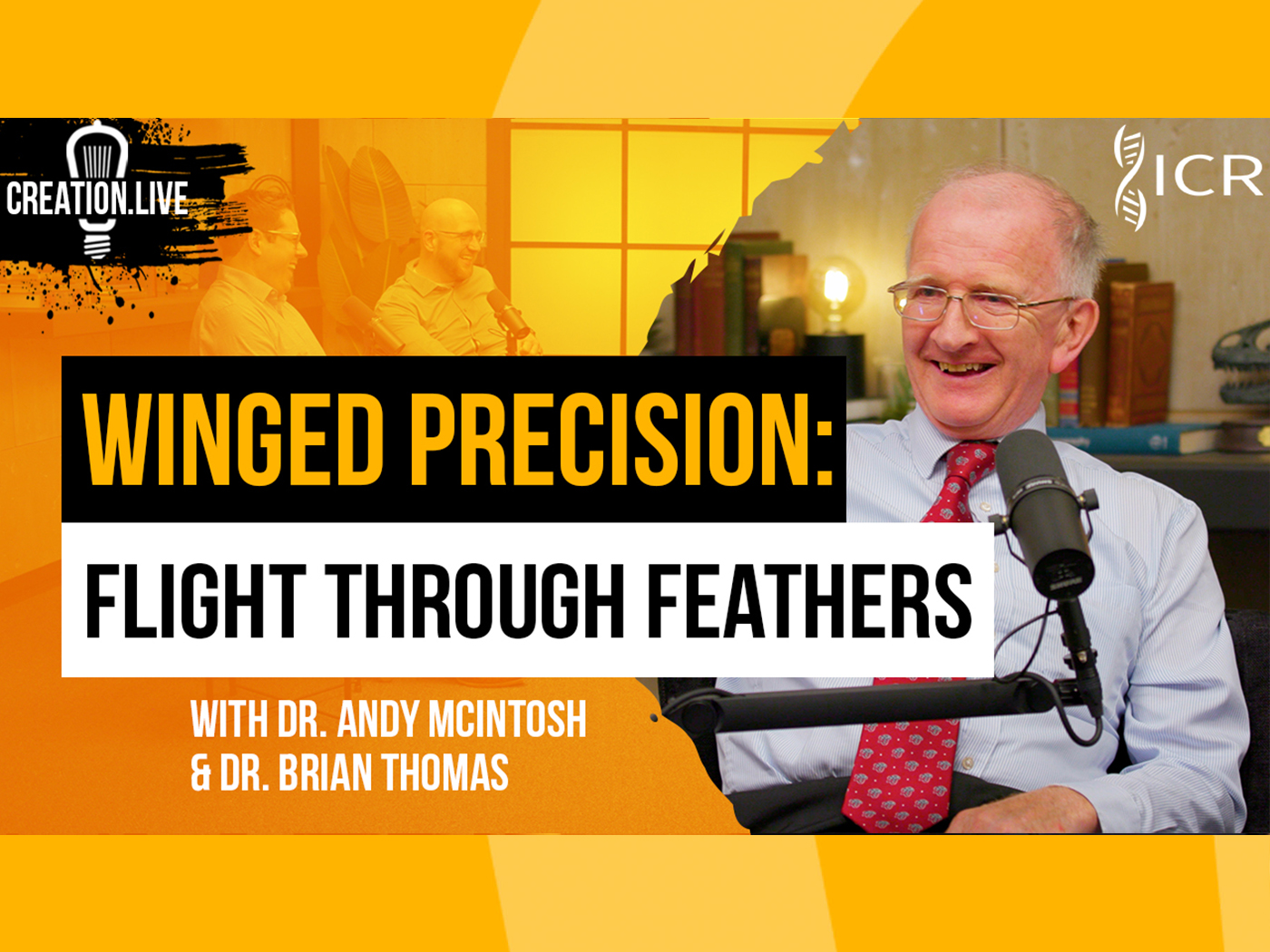There seems to be something about evolutionism that generates arrogance in many of its spokesmen. The concept is so wide-ranging that it purportedly can explain everything scientifically, from the origin of the cosmos to the origin of religion. Perhaps because it seems to eliminate the need for God, science itself becomes "god," and some evolutionists think they have become its official prophets and priests. One of their communicants, in fact, calls them its "shamans." He says:
We show deference to our leaders, pay respect to our elders and follow the dictates of our shamans; this being the Age of Science, it is scientism's shamans who command our veneration....scientists [are] the premier mythmakers of our time.1
One of these great shamans was Professor Ernst Mayr of Harvard. He told us that evolution can even answer the great "why?" questions of life. Many people of normal intelligence, including most scientists, have acknowledged that science can deal with questions beginning with "What?" and "Where," and "How," but not "Why?" The latter requires a theological answer, or at least philosophical. But not Shaman Mayr. He said:
There is not a single Why? question in biology that can be answered adequately without a consideration of evolution.2
After all, says Shermer, "cosmology and evolutionary theory ask the ultimate origin questions that have traditionally been the province of religion and theology" and evolutionism is "courageously proffering naturalistic answers that supplant supernaturalistic ones and...is providing spiritual sustenance...."3
The investment of these leaders of the evolutionary faith with such pontifical authority, however, tends to generate in them an attitude of profound impatience with such heresies as creationism. Instead of opposing the creationists with scientific proofs of macroevolution, they resort to name-calling and ridicule. A professor at a Missouri university fulminates at the "lunatic literalism of the creationists,"4 especially "the weirdness produced by leaders such as Henry M. Morris."5
And even such an articulate and highly revered evolutionist as the late Stephen Jay Gould, in a voluminous book of 1,433 pages published just before his death, referred angrily to "the scourge of creationism."6 He had refused many invitations to debate a qualified creationist scientist with the self-serving and misleading explanation that it would be a mistake to dignify creationism and its scientists in this way.
Dr. Massimo Pigliucci, who lost a number of debates with Dr. Duane Gish and other creationists, lamented the fact that "many Americans are still enchanted with dinosaurs such as John Morris and Duane Gish of the oxymoronically named Institute for Creation Research."7
Although Dr. Gould would never debate a creationist scientist, despite the inducement of large financial incentives to do so, he was quick to criticize them in print, calling them "fundamentalists who call themselves 'creation scientists,' with their usual mixture of cynicism and ignorance."8 Gould often resorted, in fact, to the standard debate technique of name-calling and ad hominem arguments commonly used when one has no factual evidence to support his position.
In his gigantic magnum opus, Dr. Gould provides a valuable historical review of the development of evolutionary theory, including the many conflicts among the evolutionists themselves, but in his 1,433 pages neglected to provide a single proof of macroevolution. The same was true of the esteemed Ernst Mayr, who in his own textbook9 could cite no such proof. Yet he had the gall to make the pronouncement that "every knowing person agrees that man is descended from the apes."10
We ignorant creationists, since we theoretically know nothing about the subject, thus, according to Gould, have "always relied, as a primary strategy, upon the misquotation of scientific sources."11 We not only are ignorant, but also by him are assumed to be liars. Strange that, in his 1,433 pages, not to mention his copious other writings, Dr. Gould failed to cite a single example of such misquotations.
Creationists are fallible human beings, of course, and it is possible that a few mistakes could be discovered among the thousands of quotes we have used from the evolutionists, but they would certainly be rare exceptions, as well as unintentional. They certainly could not obviate the tremendous case that has been built up against evolution just from admissions of evolutionists.
It would be easy if space permitted to multiply examples of the evolutionists' use of ridicule and insulting names in lieu of scientific evidence. But another type of evolutionary arrogance consists of their repeatedly professed amazement that anyone of intelligence could ever disagree with them.
One writer laments that even after the pope reaffirmed the commitment of the Catholic Church to evolution in 1996,
40 percent of American Catholics in a 2001 Gallup poll said they believed that God created human life in the past 10,000 years. Indeed, fully 45 percent of all Americans subscribe to this creationist view.12
Two eminent authors of an important article in the journal Evolution assume that this simply indicates "a lack of...understanding of evolution by the general public" and then suggests that the cause of this ignorance may be "the way the media communicates evolution and anti-evolution."13
Perhaps these authors were writing this with tongue-in-cheek! It would seem they must know that practically all the media strongly promote evolution and that the "general public" has been taught only evolution in public schools and secular colleges all their lives. Evidently all this brainwashing somehow has failed.
But why would the public favor creation? Only a statistical minority of the "general public" attends church and Sunday school. Could it possibly be that evolution is so contrary to evidence and common sense that people intuitively know that evolution is wrong? And could it be that many of these have studied the evidences for themselves and thereby found that evolution is not really scientific after all?
Higher education doesn't seem to help much. Alters and Nelson have made a fairly extensive survey of this kind of study.
Research results show that there may be surprisingly little difference in performance between majors and nonmajor introductory biology students. For example, in an ecology and evolutionary biology pretest of 1200 students, biology majors scored only 6% higher than nonmajors. When the same students were posttested on the first day of the following semester, the researchers concluded "that majors, who received a much more rigorous treatment of the material, came through the semester with the same degree of understanding as the nonmajors!"14
This strange intransigence on the part of science students when subjected to evolutionary teachings, they think, must be caused by religion!
The more deeply ingrained the religious teachings, the more the evidence was viewed through lenses different from those of students without contradictory religious beliefs.15
Well, that does make sense. If evolutionists can just persuade students to be atheists, it should be easier to make them become evolutionists!
There will always be a problem, however, in convincing students who believe that scientific generalizations should at least be based on scientific facts.
Even more difficult will it always be to convince students who believe that the biblical account of creation is the true account as revealed by the Creator Himself.
In the absence of either a divine "evolution revelation" or real scientific proof of macroevolution, it is hard to understand this pervasive attitude of intellectual superiority (even over thousands of fully credentialed creationist scientists) as anything but evolutionary arrogance.
References
- Shermer, M. June 2002. The Shaman of Scientism. Scientific American, 35.
- Mayr, E. 2001. What Evolution Is. New York: Basic Books, xiii.
- Shermer, The Shaman of Scientism, 35.
- Edis, T. 2001. Darwin in Mind. Skeptical Inquirer. 25 (2): 36.
- Ibid, 35.
- Gould, S. J. 2002. The Structure of Evolutionary Theory. Cambridge, MA: Harvard University Press, 984.
- Pigliucci, M. 2002. Defending Evolution, as Strange as It May Seem. Evolution. 56 (1), 206.
- Gould, Structure of Evolutionary Theory, 101, footnote.
- Mayr, What Evolution Is.
- Mayr, E. March/April 1988. Interview. Omni, 46.
- Gould, Structure of Evolutionary Theory, 986.
- Doyle, R. 2002. Down with Evolution. Scientific American. 286: 30.
- Alters, B. J. and C. E. Nelson. 2002. Perspective: Teaching Evolution in Higher Education. Evolution. 56: 1892. Dr. Alters was the lead author of Defending Evolution (Boston: Jones & Bartlett, 2001, 261 pp.), an anti-creationist book which was reviewed in the September 2001 issue of ICR's Acts & Facts. Dr. Nelson is a professor emeritus at the University of Indiana who unsuccessfully debated for evolution several times.
- Ibid.
- Ibid, 1898.
Adapted from Dr. Morris' article "Evolutionary Arrogance" in the February 2003 edition of Acts & Facts.
* Dr. Morris (1918-2006) was Founder of the Institute for Creation Research.
Cite this article: Morris, H. M. 2009. Evolutionary Arrogance. Acts & Facts. 38 (7): 8.



















